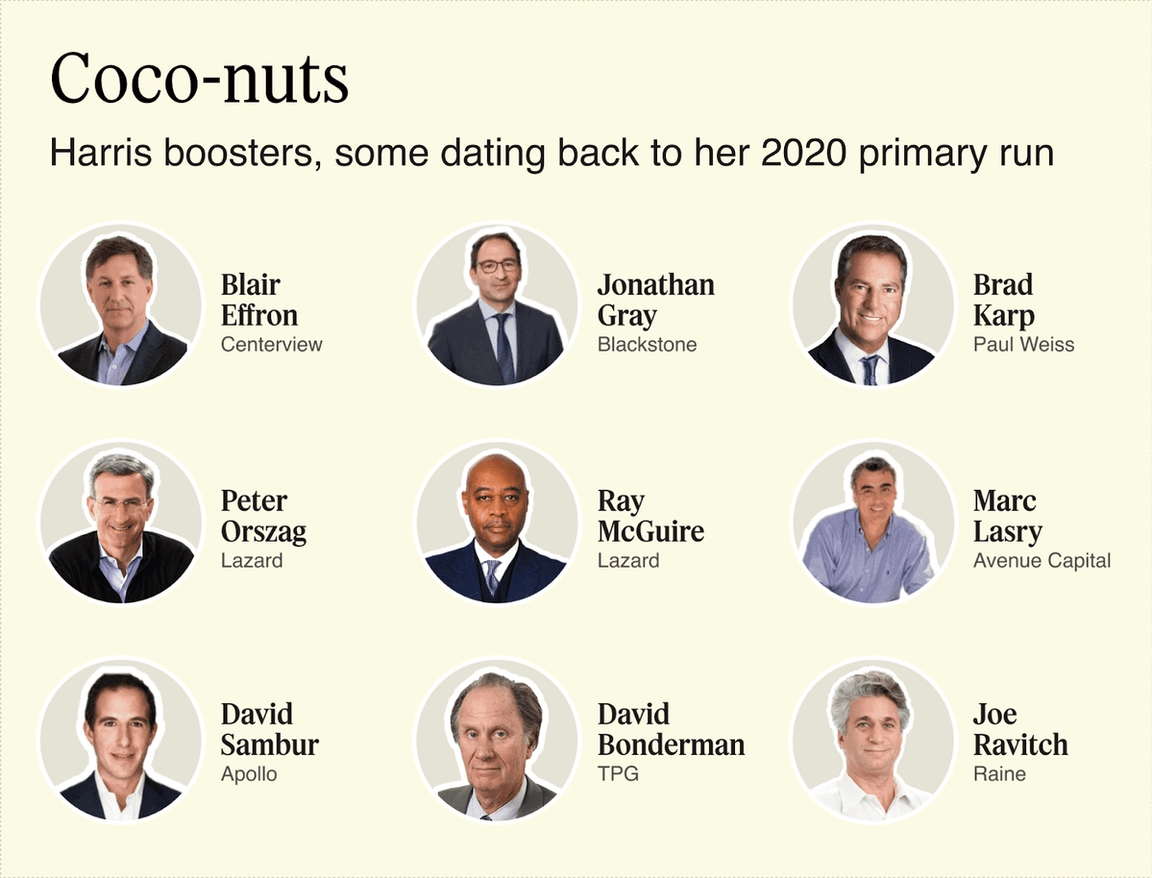THE SCENE Wall Street’s Democrats are lining up behind Kamala Harris with a mixture of relief and genuine enthusiasm for a politician many of them supported when she ran for president in 2020. Finance executives’ money and convening power between now and the Democratic convention next month will be key to Harris’ plans to “earn and win” her party’s nomination. Donors are breaking out checkbooks that have sat untouched since Joe Biden’s debate performance set off a crisis that ended with him bowing out Sunday. Future Forward, a Democratic super PAC, raised $150 million in the 24 hours following Biden’s announcement. Among those lining up behind Harris are Centerview’s Blair Effron, Blackstone’s Jonathan Gray, Lazard’s Peter Orszag and Ray McGuire, Paul Weiss’ Brad Karp, Evercore’s Roger Altman, and billionaire financier Marc Lasry, CEO of Avenue Capital.  KNOW MORE Whoever wins the Democratic nomination will be facing a formidable set of conservative billionaires backing Donald Trump, most notably Elon Musk, who told the Daily Wire that he is not in fact pledging $45 million a month to the former president’s campaign but has set up a super PAC that is likely to marshal hundreds of millions of dollars of Silicon Valley firepower. The loyalties of Democrats’ other coastal donor base — Hollywood and, to a lessening degree, Silicon Valley — are less clear. Reid Hoffman, one of the loudest voices urging Biden to stay in the race, quickly endorsed Harris, while venture capitalist Vinod Khosla called for an open convention. Harris was popular with the Wall Street crowd during the wide-open 2020 primaries, offering a centrist counterweight to Elizabeth Warren and Bernie Sanders, a fresher option than Biden, and an alternative to hometown candidate New York Sen. Kirsten Gillibrand, whose campaign never got any real altitude. They brushed off her track record as California’s attorney general, where she fined banks for mortgage misdeeds, as the cost of doing business. “Is she a progressive? Yes. Is she someone who wants to burn the building down? No,” Bill Daley, Obama’s former chief of staff who was by then a Wells Fargo executive, said in 2020. “I think she wants to strengthen the building.” Harris raised more money from lawyers, bankers, and professional investors than any of her primary challengers except Cory Booker, according to the Center for Responsive Politics. Two of her five biggest corporate donors were law firms — Paul Weiss, whose chairman is Karp, and Kirkland & Ellis, one of whose senior partners was Harris’ finance chair. LIZ’S VIEW Wall Street’s centrists may have found a reason to come back to the Democratic donor table, but many are still looking for a reason to come back to a party that they feel has lurched leftward. “Some of my friends are embarrassed to say they are voting for Trump, but not as embarrassed as they used to be,” former Goldman Sachs CEO Lloyd Blankfein told me. The alienation from Democrats isn’t really about policy. JD Vance has been a more vocal supporter of Lina Khan, the Biden administration’s tough antitrust cop, than Harris. And for all the progressive hand-wringing after last year’s regional-bank wobbles, the Trump administration’s regulatory rollback czar, Randy Quarles, made few real changes at the Fed that benefited Wall Street. “Nobody’s stressed capital buffer is going to change based on who’s in the White House,” one bank CFO told me this week. The Wall Street drift toward Trump is more about personnel. A common complaint from business and finance executives about the Biden administration is that key posts are filled by academics, not practitioners, and that the informal communication channels that existed between the private sector and White House officials during the Trump administration have gone dark. A Room for Disagreement on why Harris is a blank slate. → |
| 









